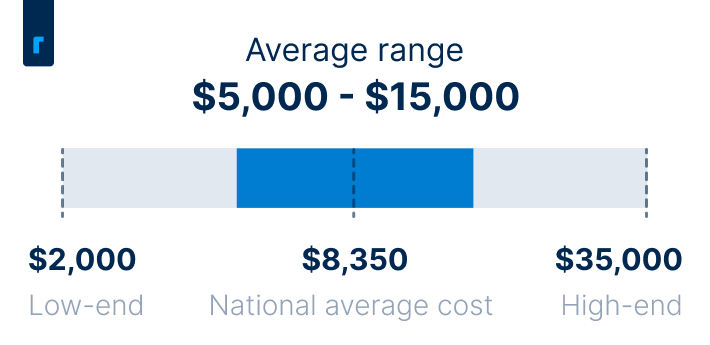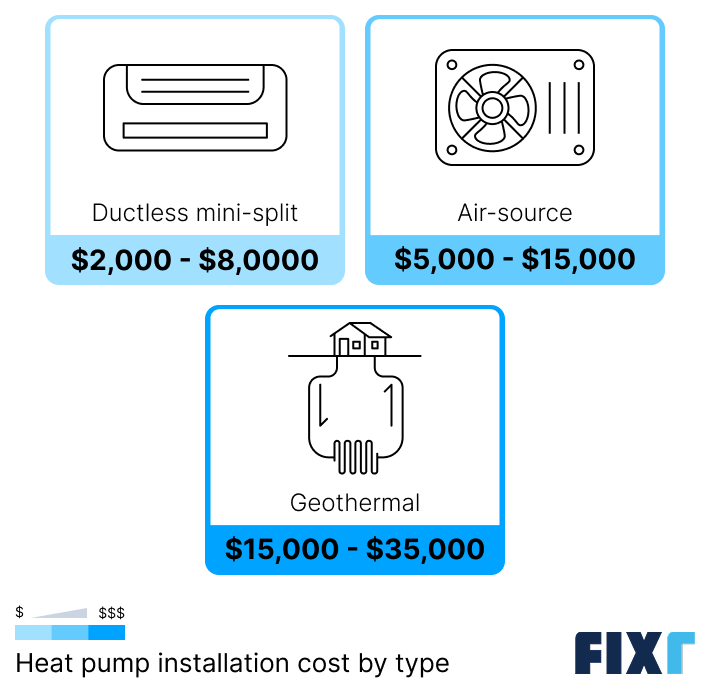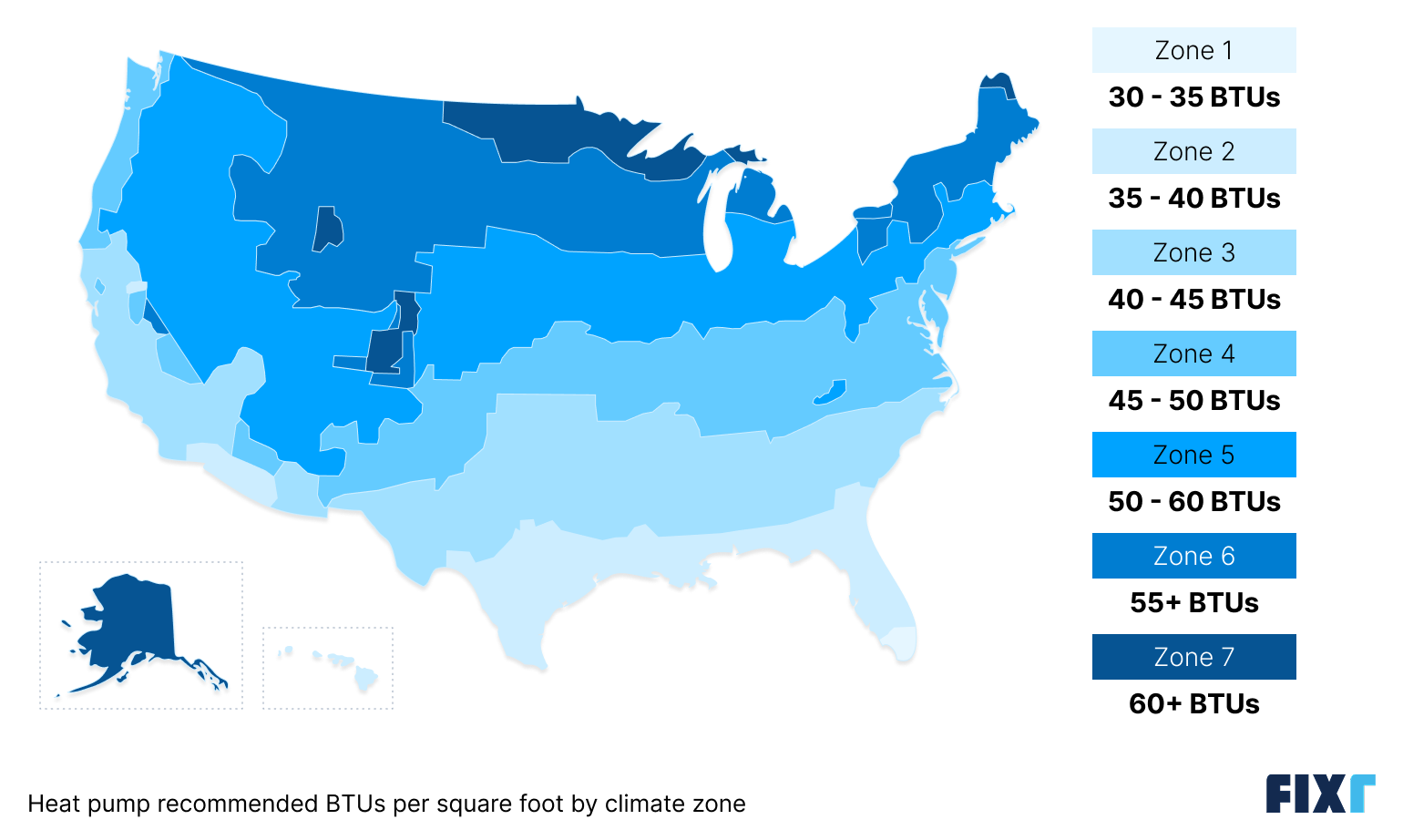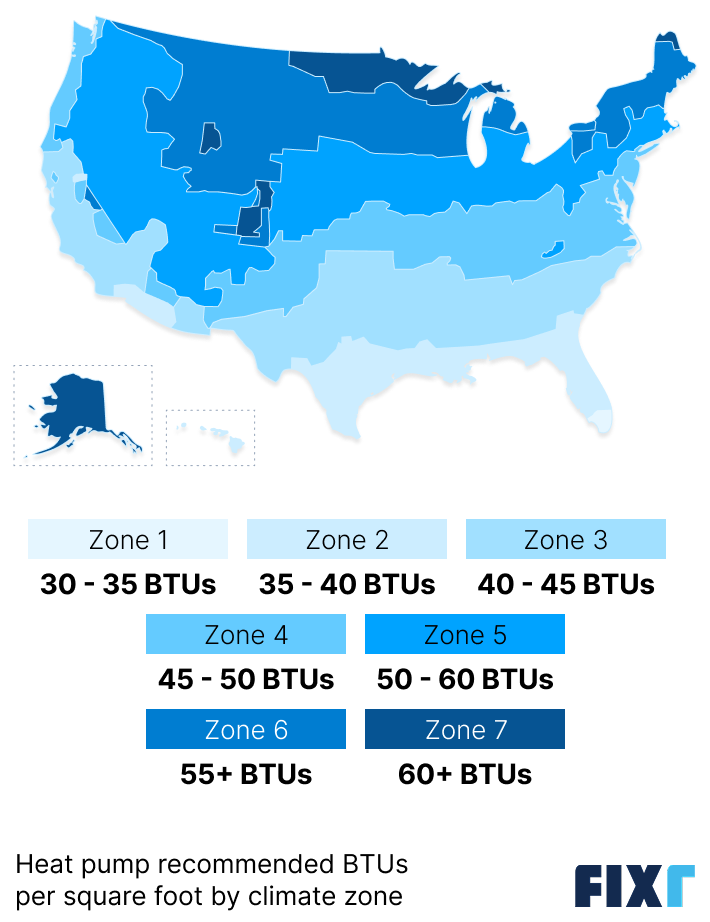Updated: January 22, 2026
Written by Dan Simms
Nieves Martinez is a writer and editor at Fixr.com, specializing in home improvement and construction content. With over five years of experience and a Master's degree in Digital Marketing, she collaborates with industry professionals to create clear, carefully reviewed cost guides and renovation resources that help homeowners make informed remodeling decisions.
Learn moreReviewed by Nieves Martinez
The national cost of a heat pump installation is $8,350, and most homeowners pay somewhere between $5,000 and $15,000. Your costs will depend mostly on the size of your home, the type of heat pump you want, and the climate in your area.
Heat pumps are relatively new HVAC solutions that use electricity to move heat between your living space and the exterior, providing the potential for high-efficiency heating and cooling. Heat pumps have increased in popularity in the last two decades as more and more homeowners search for energy-efficient technology that can provide savings on utility bills, reduce carbon footprints, and maintain comfortable indoor temperatures, even in extreme weather.
Heat Pump Replacement Cost


Heat Pump Installation Costs by Type
There are a few different types of heat pumps, and the one you choose will play a major role in your total installation costs. Air source heat pumps are, by far, the most common, but depending on your specific needs, you could also opt for a ground-source heat pump or a water-source heat pump.


Type of Heat Pump | Installation Cost |
$2,000 – $8,000 | |
Air-source | $5,000 – $15,000 |
Geothermal | $15,000 – $35,000 |
Ductless Mini-Split
A ductless mini-split is a type of air-source heat pump. Technically, it uses the same technology and operates the same way, but a mini-split is more affordable, ranging from $2,000 to $8,000, as it more often serves an individual section of your home rather than linking to your ductwork to heat and cool your entire home.
Air-Source
Air-source heat pumps are the most popular, and they cost between $5,000 and $15,000 when linked to a central heating and cooling system. These units move heat between your indoor air and the air outside. Central AC systems technically use unidirectional air-source heat pumps, while a traditional heat pump can operate in both directions, moving heat into or out of your home.
Geothermal
A ground-source heat pump is a geothermal heating and cooling system. It technically also transfers heat from one air source to another, but in the case of a ground-source heat pump, the exterior air source is one deep in the ground, where temperatures remain relatively constant. Ground-source heat pumps require extensive excavation, which pushes installation costs to between $15,000 and $35,000.
Heat Pump Installation Cost Factors
The type of heat pump you need for your home is one of the biggest cost factors to consider, but there are some other aspects that can play a major role in your heat pump installation costs, like the size or tonnage of the heat pump you need, the efficiency of the unit you choose, and the local labor costs in your area.
Heat Pump Cost by Size (Tonnage)
Just like with any other type of heating system, you need to make sure you choose the right size heat pump for your home. Heat pumps are measured in tons, a unit that directly correlates to the system's output capacity, typically defined in British Thermal Units (BTU).
Generally speaking, 1 ton is the equivalent of 12,000 BTUs, and the number of BTUs you need will depend primarily on the size of your home. Most homeowners need between 30 and 60 BTUs per square foot of living space, which means a standard 1,800-square-foot house would need 54,000 to 108,000 BTUs, or the equivalent of 4.5 to 9 tons.
If you know the square footage of your living space, you can use the table below to get an idea of what your heat pump installation will cost based on the heating and cooling capacity you need.
Home Size (Sq. Ft.) | Recommended Tonnage | Typical Cost |
1,000 | 2 | $5,000 – $8,000 |
1,500 | 2.5 – 3 | $6,700 – $14,000 |
1,800 | 3 – 4 | $8,000 – $20,000 |
2,000 | 3 – 4 | $8,000 – $20,000 |
2,500 | 3.5 – 5 | $9,500 – $22,000 |
3,000 | 4 – 6 | $15,000 – $25,000 |
Cost of Heat Pump Installation by Efficiency Ratings (SEER/HSPF)
Heat pumps are extremely efficient options for heating and cooling homes, and they almost always lead to savings on energy bills as compared to more traditional systems that burn fossil fuels for heat. Heat pump efficiency is measured using the seasonal energy efficiency ratio (SEER) and SEER2 ratings for cooling and the heating seasonal performance factor (HSPF) for heating.
Choosing more efficient equipment will usually mean paying more for the materials, but it also often means paying less in the long run due to lower heating and cooling bills. You can get an idea of what your system will cost based on efficiency ratings by using the table below. Just note that heat pump pricing can vary widely based on other factors, like heat pump size, type, and brand.
SEER2 Rating | HSPF Rating | Average Cost |
14 – 15 | 7 – 8 | $5,000 – $12,000 |
16 – 17 | 8 – 9 | $7,000 – $15,000 |
18 – 19 | 9 – 10 | $10,000 – $18,000 |
20+ | 10+ | $15,000 – $25,000 |
Labor
Labor costs to install a heat pump average around $75 to $125 per hour, in most cases. Labor usually includes removing your old unit and hauling it away, installing the new unit and refrigerant lines, making electrical connections, and testing.
Labor costs vary by location, as hourly rates usually scale with the local cost of living. Prices for labor will also vary based on the type of heat pump you’re installing, with geothermal heat pumps requiring significantly more labor for the excavation, the size of your heat pump, and the complexity of the installation overall.
What Size Heat Pump Do I Need?
Choosing the right heat pump size depends on several factors, including your home’s size, and insulation. Your climate zone is another important factor to keep in mind, as it affects how much heating or cooling your home requires.
First, determine the basic heat pump size you need by finding your climate zone on this U.S. Climate Zone Map, and take note of your home’s square footage. Heat pumps are sold by the ton, with 1 ton being roughly equivalent to 12,000 BTUs. To find the pump size you need, multiply the number of recommended BTUs per square foot for your climate zone by the square feet of your home. Divide this number by 12,000 to calculate the tonnage you need. See the table below for the number of BTUs per square foot required for each climate zone.


Climate Zone | BTUs per Square Foot |
1 | 30 – 35 |
2 | 35 – 40 |
3 | 40 – 45 |
4 | 45 – 50 |
5 | 50 – 60 |
6 | 55+ |
7 | 60+ |
It’s important to note that these numbers are just estimates, and there are many other factors at play that can affect sizing, including your ceiling height, the age of your home, the number of zones you have, your heating and cooling habits, and more. Always have a professional conduct a Manual-J calculation to determine the right size heat pump for you.
Additional Costs and Considerations
There are a few other minor cost factors you should think about, as well as some other considerations to make before you hire a pro to install a heat pump in your home.
Ductwork condition and modifications: Unless you’re installing a ductless mini-split, you should consider the condition of your existing ducts and couple repairs or replacement with your installation. This will add significantly to the upfront cost, but fixing air duct leaks and installing ducts with better insulation can end up saving you much more money on utility bills over time.
Geographic location and climate: Your location affects labor costs, so expect to pay more for labor in areas with a higher cost of living, like major cities. You should also consider the climate in your area, as more extreme climates may make oversized heat pumps a necessity, and it may even mean a standalone heat pump isn’t even a viable option.
Permits and inspections: Most municipalities require permits for any mechanical replacements, so you’ll need permits to install a heat pump. On average, permits and inspection fees add between $50 and $300.
Warranty terms and maintenance plans: Heat pumps typically last 10 to 15 years, sometimes longer, so check your unit’s warranty before buying; paying a bit extra for a longer warranty can save future repair costs. You may also consider a maintenance plan, which helps keep your system efficient and covers repairs and part replacements for an annual fee.
Brand: As heat pumps have become increasingly popular, more manufacturers are offering them as standalone heating and cooling solutions. The brand you choose can affect costs, system longevity, durability, and even warranty coverage. Brands like Goodman and Rheem offer more affordable options, while Carrier and Trane provide high-efficiency heat pumps at a higher upfront cost
Benefits of Installing a Heat Pump
Heat pumps may have a higher upfront cost, but they offer a range of long-term benefits that can make them a smart investment.
Energy savings over time: Heat pumps are some of the most efficient heating and cooling solutions available. According to the U.S. Department of Energy, a heat pump could reduce electricity consumption for HVAC purposes by up to 75% compared to other electric heating equipment.
Reduced carbon footprint: That boosted efficiency also means you reduce your carbon footprint. Not only does lower electricity consumption mean less strain on the environment, but you’re also not burning fossil fuels, which reduces emissions dramatically.
Safer operation: Heat pumps are safer to operate than gas and oil furnaces and boilers because you’re not combusting any material. There’s no risk of a gas leak or oil leak, and there’s no carbon monoxide production or other emissions that reduce indoor air quality.
Year-round comfort: Heat pumps can provide both heating and cooling, which means they can keep your house comfortable all year.
Relatively low maintenance: Heat pumps require far less maintenance than more traditional heating systems, primarily because they don’t rely on combustion and don’t need frequent cleaning or valve replacements. They also have fewer moving parts than split systems, so long-term maintenance costs will be lower.
Are Heat Pumps Worth It?
Heat pumps are a smart choice if you’re replacing your HVAC system, especially when you need both heating and cooling. They offer an all-in-one heating and cooling solution, so they could save you money as opposed to replacing both parts of a traditional split system. Many heat pump models qualify for rebates or efficiency tax credits. Their high efficiency also helps lower long-term energy bills.
While heat pumps may need backup heating in extremely cold climates, they still reduce energy costs during milder weather. Homes with solar panels can make heat pumps even more cost-effective, potentially covering most or all heating and cooling expenses year-round.
Signs You Need a New Heat Pump
Heat pumps typically last for 10 to 15 years. If yours is approaching that age or showing signs of wear, it may be time to consider a replacement. Keep an eye out for common warning signs and consider the cost of heat pump repairs vs. the cost of replacement.
Ongoing issues with performance: If you’ve had repeat issues with performance, heating or cooling outages, or problems with short-cycling, it might be time for a replacement.
Frequent repairs: If you’ve called your HVAC tech multiple times in the last year or two, it’s a good sign that you’re due for a new heat pump.
Increases in energy bills: Heat pumps use electricity to move heat from one place to another, and when they lose efficiency, they consume more electricity to provide a similar output. It might be time to replace your heat pump if you’re noticing unexpected spikes in your electric bills.
Uncomfortable indoor temperatures: A dip in heat pump efficiency will lead to poor performance, which could mean you experience unusually cold temperatures in the winter or hot temperatures in the summer.
Old refrigerant: Older heat pumps often used R-22 refrigerant, which is now prohibited for sale. If your heat pump was manufactured before 2015, there’s a chance it uses the old refrigerant. If you have an issue with that refrigerant, you will no longer be able to get the unit serviced, so updating to the newer refrigerant might be wise before you run into an issue.
Ways to Save on Heat Pump Installation
Heat pumps are a smart investment, but installation can be pricey. Luckily, there are a few ways you can save money and keep your project within budget.
Rebates and incentives: Check the Database of State Incentives for Renewables and Efficiency (DSIRE) for local perks from your state, municipality, or utility company.
Off-season installation: HVAC contractors are busiest in the summer and winter, when system breakdowns are most common and most urgent. If possible, schedule your installation for the fall or spring, as this can sometimes lead to decreased labor costs.
Get multiple quotes: You should get estimates from at least three HVAC contractors in your area to compare and find the best value possible for your project. You can rule out unusually low and high estimates, as well as contractors who don’t perform a Manual-J calculation to size your system.
Have a pro size your system: Having a pro perform one on your home can ensure your system is sized accurately and works efficiently to heat and cool your home. This will reduce ongoing maintenance costs and also lead to lower utility bills.
DIY vs. Hiring a Pro
Replacing any HVAC equipment, including heat pumps, is not a job that’s suitable for DIYers. It involves working with electrical components, and any mistakes could lead to electrocution and an increased risk of house fires. An inexperienced DIYer is also more likely to make errors when it comes to sizing a heat pump, which could lead to unnecessary strain on your new equipment and premature failure, or poor efficiency that drives utility bills higher.
In addition, most manufacturers will void your warranty if you don’t have a professional installer put in your unit, and most municipalities only allow licensed professionals to pull HVAC permits and work with refrigerants.
Hiring a professional is not only a good idea for maximum system efficiency and longevity, but it also keeps you and your home safe and sets you up for years of efficient home heating and cooling without issues.
How Much Does a Heat Pump Cost to Run?
The cost to run a heat pump varies widely based on local electricity costs, heat pump size and efficiency, the type of heat pump, your climate, and more. Just as an example, though, for an average 1,800-square-foot home with a 5-ton heat pump and a SEER2 rating of 18 operating in a home for 4 hours a day, you’d pay an average of $1,200 annually to run your heat pump, assuming the cost per kilowatt-hour (kWh) in your area is the national average of 17.47 cents. That’s a monthly cost of just $100 for both heating and cooling.
Heat Pump vs. Furnace Cost
When deciding between a heat pump and a furnace, it is important to compare both the upfront and ongoing costs to determine which is best for your home.
First off, a heat pump costs an average of $8,350, while furnace installation costs an average of $4,800. However, since a furnace only provides heating, most homeowners also need a central AC system for cooling, which adds between $5,000 and $12,000.
In addition to those upfront savings, heat pumps are more energy-efficient and can lower your utility bills by $300 to $650 per year, according to the National Renewable Energy Laboratory (NREL). Based on the average upfront savings compared to replacing a furnace and a central AC system, and assuming your heat pump lasts for 15 years, you’re looking at all-in savings of between $9,700 and $14,950. Those numbers could climb even higher since heat pumps require less maintenance and fewer repairs.
FAQs
A heat pump for a 2,000-square-foot home will cost between $8,000 and $20,000. Costs vary widely based on the type of heat pump you choose, the age of your home, the quality of your insulation, your ceiling height, the climate in your area, and more. Contact an HVAC pro to provide a more personalized estimate.
Labor costs to install a heat pump typically average between $75 and $125 per hour, depending on your location, the complexity of the installation, and the experience of the technician.
The total cost to install a heat pump averages $8,350, and prices typically range from $5,000 to $15,000, including the cost of the heat pump and installation. Costs depend mostly on the size of your home, the type of heat pump you want, and the climate in your area.
The primary disadvantages of a heat pump are higher upfront installation costs and diminished efficiency in extreme cold. A central heat pump typically costs $5,000 to $15,000, which is nearly double the cost of a standard gas furnace. Furthermore, when temperatures drop below 40°F, the system may rely on expensive auxiliary heat, and because it runs year-round for both heating and cooling, it has a shorter lifespan of 10 to 15 years.
